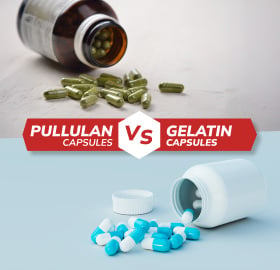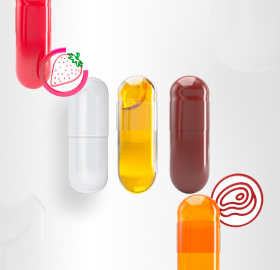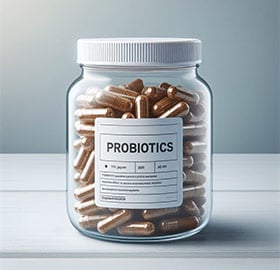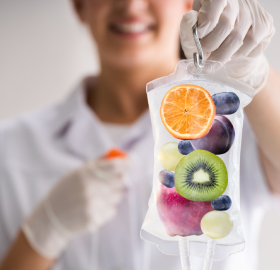As we reported in our blog on 2024 nutraceutical trends, products that support gut health and the gut microbiome – such as probiotics and prebiotics – continue to grow in popularity. However, many people wonder what the difference is between probiotics and prebiotics, especially because they sound so similar.
The role of the microbiome
To understand the role of prebiotics and probiotics, you must first have a basic understanding of the body’s microbiome. The microbiome, which is found throughout the body, consists primarily of living microorganisms, including bacteria, viruses and fungi. Each person’s microbiome is unique. Having a diverse microbiome is both normal and desirable, because this diversity makes it more likely to be able to fight harmful pathogens.
Much research is currently being done regarding the gut-brain axis and the relationship between gut health and overall health. It appears that when the gut’s microbiome gets out of balance, this can cause a variety of health problems, including immune system hypersensitivity.
Understanding probiotics and prebiotics
Probiotics and prebiotics work synergistically to help keep the gut and its microbiome healthy and in balance, thereby helping to support overall health and wellness.
Probiotics, which are live microorganisms, are the “good” bacteria and yeasts that live in and on your body, and help keep your body healthy. Probiotics are found in foods prepared by bacterial fermentation, such as yogurt, sauerkraut, kefir, tempeh and kimchi, and can also be taken as supplements.
Prebiotics can be seen as “food” for probiotics. Prebiotics are nondigested soluble plant fibers, or carbohydrates, that are fermented in the gut to produce beneficial chemicals. Prebiotics fuel the growth of probiotics in the gut, thereby creating a more diverse and healthy gut microbiome.
Prebiotics are found in many high-fiber foods, including whole grains, lentils, fruits, vegetables, berries and more. Prebiotics are also available as supplements.
Benefits of probiotics
When looking at probiotics for gut health, an important thing to understand is that probiotics can help maintain the beneficial bacteria in the gut, and help restore balance when harmful bacteria begin to grow and throw the gut’s microbiome out of balance. When harmful bacteria get out of hand, the entire digestive system can stop functioning properly.
An interesting aspect of the relationship between probiotics and prebiotics is that probiotics break down the byproducts of the fermentation process that prebiotics undergo in the gut. One of these byproducts is the short-chain fatty acids that help feed intestinal cells and keep the intestinal barrier healthy.
Because gut health has been linked to a variety of health benefits, probiotics have as well. The benefits of probiotics potentially include a positive role in digestive health (including regularity), immune function, cardiovascular health, mental health and mood.
Keep learning about supplement trends...
Nutraceutical Trends 2024
Differences Between HPMC & Pullulan Capsules
The Evolution of Dietary Supplements
Differences in probiotics
There are many different types of probiotics, each containing different strains or combinations of strains of bacteria and/or yeast. Each of these strains has a different potential impact on the body.
Choosing the right probiotic often means looking at probiotics for specific needs. For example, some studies suggest the following options…
• To support the immune system: Bifidobacterium and Lactobacillus.
• To alleviate symptoms of irritable bowel syndrome: Lactobacillus rhamnosus LRH020.
• To reduce the risk of antibiotic-associated diarrhea: Saccharomyces boulardii.
• To help reduce depression and anxiety: Lactobacillus rhamnoses HN001.
The best capsules for probiotics
The best capsules for probiotics are therefore acid-resistant capsules, such as CapsCanada’s vegetarian K-CAPS® delayed release capsules. K-CAPS® delayed release capsules are specially formulated so that the HPMC itself is acid-resistant. These capsules protect their contents from stomach acids and deliver them safely to the small intestine, without the need to add chemicals, phthalates, solvents or additional coatings during manufacturing.















